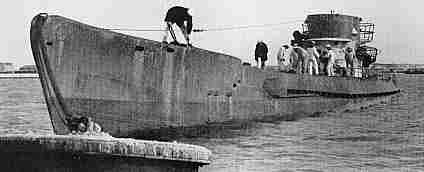- Author
- Schaeffer, Heinz
- Subjects
- Biographies and personal histories, WWII operations, History - WW2
- Tags
-
- RAN Ships
- None noted.
- Publication
- March 2004 edition of the Naval Historical Review (all rights reserved)
A previous article described how surrendering German U-Boats were boarded and taken as prizes into captivity to remote lochs in Scotland and Northern Ireland. One wonders what the German Navy view was at that time. One such account was found in the NHS Library, in a book (entitled U-Boat 977, published 1952) by Heinz Schaeffer, CO of U-977.
BRITISH PROPAGANDA had recently estimated a U-boat’s life at forty days and this time it was right and we knew it. Forty days was generous. Well, we had been at sea for eight altogether so there should be 32 to go. While we were groping through with our Snort my junior watchkeeper brought me a signal from headquarters, which roughly ran like this:
‘To all men of the Submarine Service. For five years you have fought gallantly on all the seven seas. You can look back with pride on what you have achieved. You have done such deeds as were never accomplished before and will never be equalled in the future. You have made history yet in spite of all you have endured the worst still lies ahead. Tomorrow we surrender, and from tomorrow you will take your orders from the Allied Command.‘ We did not pick up the speaker’s name because the aerial attached to our Snort broke before we got so far. Surely it was not Doenitz, after all his fine words? No, it was probably an enemy trap – they must have decoded our cypher and picked up our wavelength. I discussed its possible meaning with my officers. It seemed out of the question that Doenitz as head of state should have ordered unconditional surrender. ‘We shall fight to the very last man. We shall never, never surrender’ he had said the last time we saw him.
Next day we picked up another signal, which I again felt must have come from the enemy since it was quite irreconcilable with the outlook and temper of our own leaders and at complete variance with our last orders. Finally there came a third signal from the Allied Disarmament Commission to all U-boats at sea to surface, put their armament out of action and hoist blue or white flags.

At this point I decided to take the crew into my confidence – they had been kept in the dark too long and now I spoke to them openly more or less as follows:
‘Kameraden. We have lost the Second World War. We must decide the right course to take. We can either hoist the white flag, or sink the boat, or put into harbour in some country that has behaved honourably all through the war, such as Argentina. I do not think that Admiral von Doenitz has ever formally surrendered. There can be no question of our accepting the enemy’s orders without knowing more of the circumstances.
I suggest that we continue on our way, but that we do not attack a single ship, for I would not have us revenge ourselves with the blood of innocent men. It is futile to carry on the war alone. We have all the stores we need for our voyage to Argentina to spare us the bitter bread of captivity.‘ When I had finished they began hammering it all out and separating into various groups. I did not hurry them. When the vote was taken, 30 out of the 48 plumped for South America, two wanted to go to Spain, and 16 expressed a wish to return to their families – these last all married men, nearly all of them petty officers, the oldest on board. I proposed to land them in Norway, from where they would perhaps be able to make their way home.
(Which he did – then attempted the long route around Britain to south of Gibraltar, entirely by snorting. Amazingly U-977 reached Argentina on 17 August 1945 after 66 days. U-530 had arrived earlier and both boats accepted internment by the Argentine Navy (now nominally one of the Allies) – Ed)




